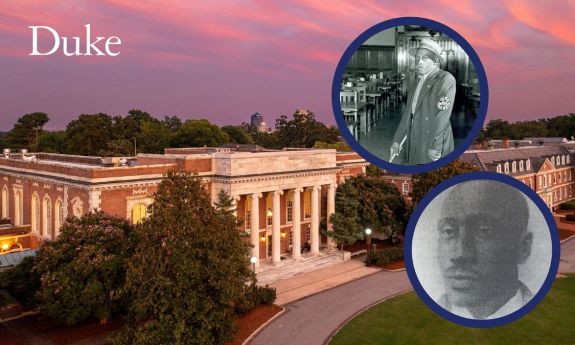East Campus Union Renamed for Longtime Custodians
Building will honor father and son who spent decades at Duke

“This building is a dining hub for first-year students, a dynamic center of student life on the former Trinity College campus, and just blocks away from the Walltown community.” Price continued. “Naming it in honor of the Walls acknowledges the important role they played, and that generations of housekeeping and dining staff members have played, in nurturing our campus community and creating a supportive environment for students throughout Duke’s history.” (President Price shared the news Tuesday afternoon in an e-mail message to members of the Duke community.)
A dedication ceremony for the building will be held during Founders’ Weekend this September.
George Wall, a formerly enslaved person, was hired in 1870 in Randolph County by Trinity College President Braxton Craven. After the college moved to Durham in 1892, George Wall worked as a custodian at Trinity College and at Trinity Park School, a preparatory school that operated on the Trinity campus. In 1899, George Wall purchased land near the new campus on Third Street (also rendered in the census as Wall Street and now known as Onslow Street), and with his wife, built a home there. He became a leader in his community, a now-historic neighborhood that became known as Walltown, honoring George Wall’s leadership in establishing the neighborhood.
Over the decades of his employment, George Wall was close to many students and campus leaders, including Trinity College President John Franklin Crowell.
George-Frank Wall, the oldest of George Wall’s nine children, grew up in Durham and also worked at Trinity College and Duke as a custodian for more than 50 years until his death in 1953. A conscientious worker with high standards, Wall was well known to generations of students who greeted him in the dining halls.
When George-Frank Wall wrote his will in 1946, he left $100 to Duke University. Wall’s gift was added to the scholarship fund—decades before there were Black faculty members on campus and before Black students were first admitted to the university.
George-Frank Wall named Duke President Robert Flowers as the executor of his estate.
Over the years, Duke has forged strong partnerships with Durham’s Walltown neighborhood, including the Walltown Neighborhood Clinic, which provides accessible and affordable healthcare services to Durham residents.
“The Walls’ impacts on the university are complemented by their contributions to shaping Durham, which endure through the Walltown community, one of 14 partner neighborhoods in the Duke-Durham Neighborhood Partnership,” said Stelfanie Williams, vice president for Durham and community affairs.
“Longstanding collaboration with our Walltown neighbors is a powerful example ofDuke’s ongoing commitment to sustaining partnerships, preserving legacies, and honoring shared history,” Williams said.
In recent years, a small number of buildings on campus have been renamed. In 2020, the Sociology-Psychology Building on West Campus was renamed for the late Trustee Emerita Wilhelmina Reuben-Cooke, who came to Duke in 1963 as one of the first five Black undergraduates.
In 2024, Duke celebrates its Centennial, marking one hundred years since Trinity College became Duke University. Through stories and community events, the Centennial aims to inspire pride, deepen understanding of Duke’s history, and launch the university into its second century. To learn more, visit 100.duke.edu.